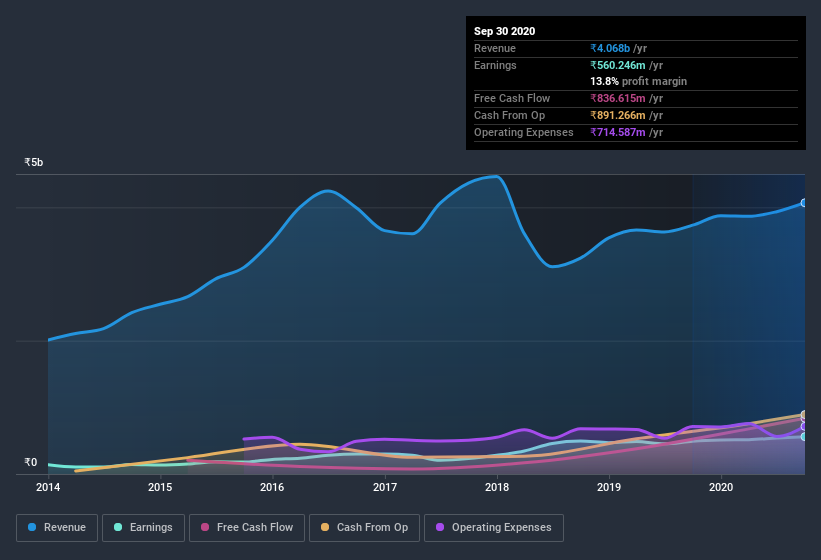Lincoln Pharmaceuticals's (NSE:LINCOLN) Earnings Are Growing But Is There More To The Story?

Statistically speaking, it is less risky to invest in profitable companies than in unprofitable ones. That said, the current statutory profit is not always a good guide to a company's underlying profitability. In this article, we'll look at how useful this year's statutory profit is, when analysing Lincoln Pharmaceuticals (NSE:LINCOLN).
While Lincoln Pharmaceuticals was able to generate revenue of ₹4.07b in the last twelve months, we think its profit result of ₹560.2m was more important. As depicted below, while its revenue may have fallen over the last few years, its profit actually improved.
See our latest analysis for Lincoln Pharmaceuticals

Of course, when it comes to statutory profit, the devil is often in the detail, and we can get a better sense for a company by diving deeper into the financial statements. So today we'll look at what Lincoln Pharmaceuticals' cashflow tells us about the quality of its earnings. That might leave you wondering what analysts are forecasting in terms of future profitability. Luckily, you can click here to see an interactive graph depicting future profitability, based on their estimates.
A Closer Look At Lincoln Pharmaceuticals' Earnings
As finance nerds would already know, the accrual ratio from cashflow is a key measure for assessing how well a company's free cash flow (FCF) matches its profit. The accrual ratio subtracts the FCF from the profit for a given period, and divides the result by the average operating assets of the company over that time. You could think of the accrual ratio from cashflow as the 'non-FCF profit ratio'.
Therefore, it's actually considered a good thing when a company has a negative accrual ratio, but a bad thing if its accrual ratio is positive. While it's not a problem to have a positive accrual ratio, indicating a certain level of non-cash profits, a high accrual ratio is arguably a bad thing, because it indicates paper profits are not matched by cash flow. Notably, there is some academic evidence that suggests that a high accrual ratio is a bad sign for near-term profits, generally speaking.
Lincoln Pharmaceuticals has an accrual ratio of -0.10 for the year to September 2020. That indicates that its free cash flow was a fair bit more than its statutory profit. To wit, it produced free cash flow of ₹837m during the period, dwarfing its reported profit of ₹560.2m. Lincoln Pharmaceuticals shareholders are no doubt pleased that free cash flow improved over the last twelve months.
Our Take On Lincoln Pharmaceuticals' Profit Performance
As we discussed above, Lincoln Pharmaceuticals has perfectly satisfactory free cash flow relative to profit. Because of this, we think Lincoln Pharmaceuticals' earnings potential is at least as good as it seems, and maybe even better! Better yet, its EPS are growing strongly, which is nice to see. Of course, we've only just scratched the surface when it comes to analysing its earnings; one could also consider margins, forecast growth, and return on investment, among other factors. So while earnings quality is important, it's equally important to consider the risks facing Lincoln Pharmaceuticals at this point in time. For example, we've discovered 2 warning signs that you should run your eye over to get a better picture of Lincoln Pharmaceuticals.
This note has only looked at a single factor that sheds light on the nature of Lincoln Pharmaceuticals' profit. But there is always more to discover if you are capable of focussing your mind on minutiae. Some people consider a high return on equity to be a good sign of a quality business. While it might take a little research on your behalf, you may find this free collection of companies boasting high return on equity, or this list of stocks that insiders are buying to be useful.
If you decide to trade Lincoln Pharmaceuticals, use the lowest-cost* platform that is rated #1 Overall by Barron’s, Interactive Brokers. Trade stocks, options, futures, forex, bonds and funds on 135 markets, all from a single integrated account. Promoted
New: AI Stock Screener & Alerts
Our new AI Stock Screener scans the market every day to uncover opportunities.
• Dividend Powerhouses (3%+ Yield)
• Undervalued Small Caps with Insider Buying
• High growth Tech and AI Companies
Or build your own from over 50 metrics.
This article by Simply Wall St is general in nature. It does not constitute a recommendation to buy or sell any stock, and does not take account of your objectives, or your financial situation. We aim to bring you long-term focused analysis driven by fundamental data. Note that our analysis may not factor in the latest price-sensitive company announcements or qualitative material. Simply Wall St has no position in any stocks mentioned.
*Interactive Brokers Rated Lowest Cost Broker by StockBrokers.com Annual Online Review 2020
Have feedback on this article? Concerned about the content? Get in touch with us directly. Alternatively, email editorial-team@simplywallst.com.
About NSEI:LINCOLN
Lincoln Pharmaceuticals
Engages in manufacturing and trading of pharmaceutical products in India.
Flawless balance sheet established dividend payer.


